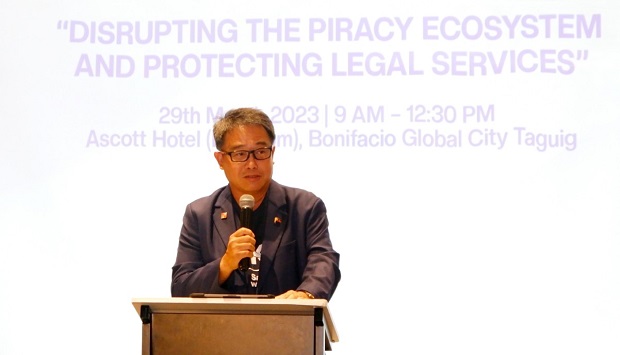The Intellectual Property Office of the Philippines (IPOPHL) has revealed that it recently completed the draft rules on voluntary site-blocking together with local Internet service providers (ISPs) to fight piracy in the country.

Photo from IPOPHL
The news was shared by IPOPHL director general Rowel S. Barba last March 29 at an anti-piracy symposium titled “Disrupting the Piracy Ecosystem and Protecting Legal Services.”
During the event, Media Partners Asia revealed a study that estimates revenue leaks from piracy in online video alone reached $781 million in 2022. In employment, it estimates 11,988 jobs in the same year were jeopardized due to piracy.
Media Partners Asia said piracy controls “will help unlock more legal customers and revenue growth for the premium online video category,” potentially boosting online video local content investment to $390 million by 2027 versus the current projected trajectory of $138 million, and employment with 3,000 jobs more.
One piracy control that has been drawing national attention in recent months is site-blocking, given its success stories in slashing piracy consumption in Indonesia and Thailand.
“IPOPHL plans to implement a site-blocking mechanism hopefully within the year. This will provide IEO the authority to issue an order to the ISPs to block or disable and prevent access to pirate websites,” said Bureau of Legal Affairs assistant director and IP Enforcement Office (IEO) supervising director Christine V. Pangilinan-Canlapan.
“We will soon issue the rules and regulations on the site-blocking procedures, which will detail an expedited process on blocking by ISPs of pirated websites.”
Pangilinan-Canlapan also cited the ISPs for coordinating closely with IPOPHL to set site-blocking in motion, creating a structure for the practical implementation of an effective and fast mechanism that sufficiently provides due process.
The rules will apply to websites that have the primary purpose or effect of infringing copyright or facilitating copyright infringement online.
It will also target piracy websites that contain contents made, produced or replicated without the consent of the right holder or the person duly authorized by the right holder.
The rules, Pangilinan-Canlapan clarified, will not apply to websites being used for the sale of counterfeit goods since these are covered by an e-commerce agreement between brand owners and online platforms signed in March 2021.
Also supporting IPOPHL’s efforts to establish and expedite site blocking and take down procedures is House Bill 7028 of Albay representative Joey S. Salceda authorizing IPOPHL to issue site blocking orders directly to ISPs.
The bill has been approved by the House of Representatives Committee on Trade and Industry chaired by Batangas representative Marvey A. Mariño.
Barba said site-blocking is part of IPOPHL’s efforts to create an environment for a trusted and robust intellectual property (IP) enforcement system.
“This is to assure rights holders in the creative economy that if they have issues concerning their IP rights, they can rely on an IP enforcement system that is prompt, responsive, efficient and effective,” Barba said.
“However, IP enforcement and protection efforts cannot be successful without the IP rights holders who need to initiate the process to go after their infringers,” the Barba added.
“The prosecution of IP cases is not automatic. Hence, we need copyright owners to be more aware of their rights and the processes to efficiently exercise their rights and seek redress, all of which IPOPHL is enabling through our workshops and industry-specific collaborations.”




